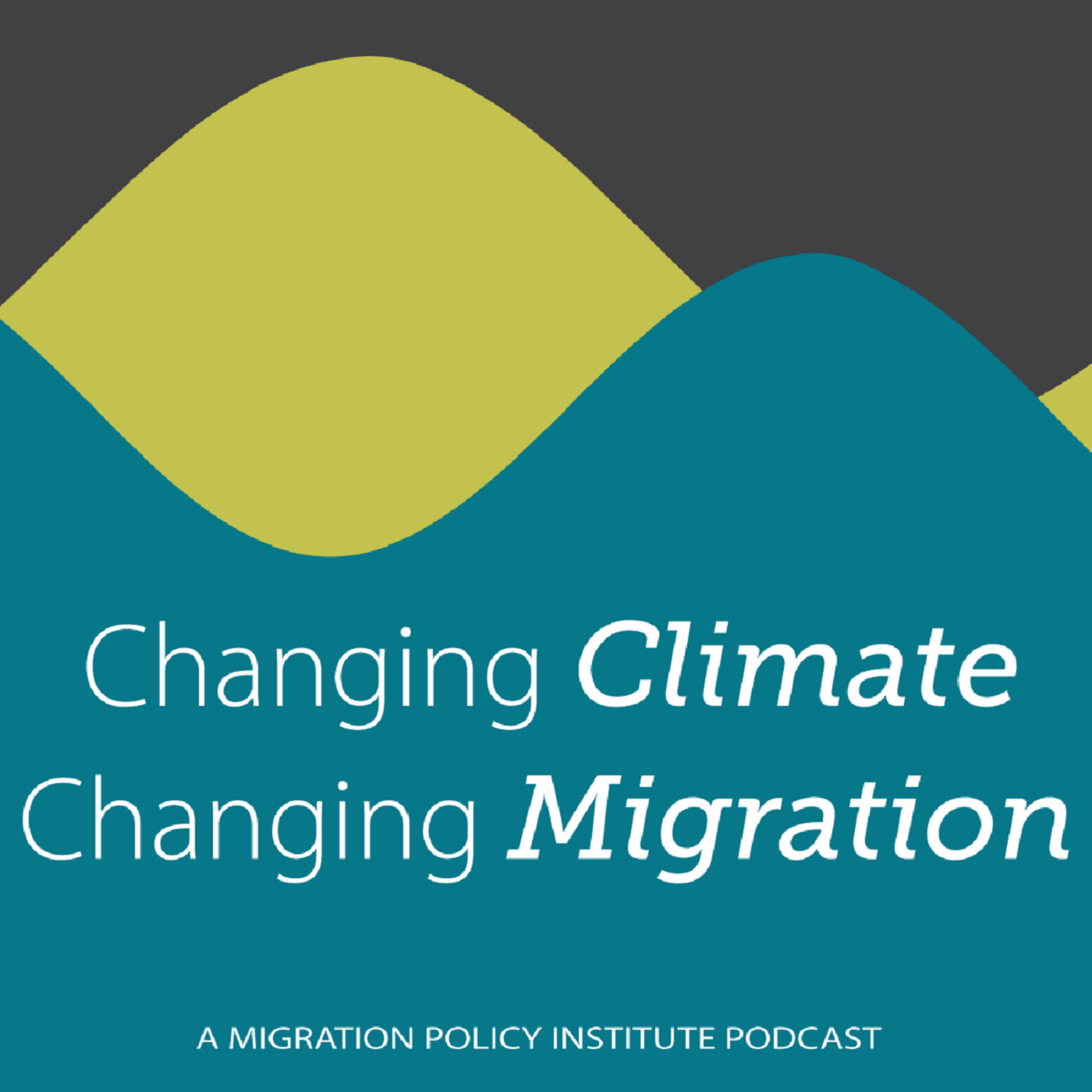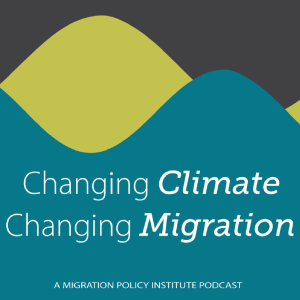

How are climate change and environmental degradation affecting human migration across borders and within countries? We explore with top experts in this Migration Policy Institute podcast.
Episodes

Tuesday Dec 16, 2025
Trapped by Climate Change: The Economics of Staying or Leaving
Tuesday Dec 16, 2025
Tuesday Dec 16, 2025
It is not guaranteed that someone harmed by a natural disaster or other environmental change will leave their home. A complicated web of factors affects whether climate-vulnerable individuals want to—or even can—move. One of these factors is financial: How much money or other resources someone has at their disposal.
In this episode, we speak with Kelsea Best of The Ohio State University about climate (im)mobility and the economic and other factors that help shape futures amid changing climates. We also discuss the notion of “climate gentrification,” which occurs when wealthier people move into traditionally lower-income neighborhoods that are better shielded from natural disasters and other environmental harms.

Monday Nov 10, 2025
The Young Lives Uprooted by Climate Change
Monday Nov 10, 2025
Monday Nov 10, 2025
Children are especially vulnerable to displacement linked to climate change. Each year, millions of young people are displaced by weather-related disasters, as schools and other services break down and adults send children away to find safety. Forced from their homes, children often face new challenges, including being unable to access education or medical care, and even heightened risk of violence and other dangers. Despite the unique challenges that children face in displacement, there are relatively few international laws or systems particularly designed to assist those forced to move because of environmental factors. We speak with UNICEF’s Laura Healy about this reality and the opportunities to better protect children in a warming world.

Wednesday Oct 29, 2025
Will Climate Change Push Some People into Statelessness?
Wednesday Oct 29, 2025
Wednesday Oct 29, 2025
Within the next few decades, rising sea levels could wipe some small Pacific Island nations off the face of the earth. The prospect that the physical territory of countries such as Kiribati and Tuvalu is no longer habitable raises the prospect that their nationals could lose their citizenship, becoming stateless. It also poses profound questions for international law and the obligations of other countries.
How likely is this possible outcome, and what can countries do to protect their sovereignty and their citizens? Join our discussion with Mark Nevitt, an international law scholar at the Emory University School of Law.

Wednesday Aug 27, 2025
Wednesday Aug 27, 2025
It is no easy task to say with certainty that a particular storm, drought, or other extreme weather event causes human displacement, or that those individual events are due to human-caused climate change. Hurricanes, wildfires, mudslides, monsoons, and other sudden-onset events, as well as slow-onset ones such as drought, extreme heat, and sea-level rise, have happened for millennia. To attribute specific impacts to human-made environmental change requires scientists to parse through years of data and pattern detection. In this episode, we speak with climate scientist Lisa Thalheimer, of the International Institute for Applied Systems Analysis, to explain how experts untangle the connections between climate change and migration.

Thursday Jun 26, 2025
Small Islands, Big Challenges: Climate Change and Migration in the Caribbean
Thursday Jun 26, 2025
Thursday Jun 26, 2025
The small island nations that make up the Caribbean are incredibly vulnerable to the impacts of climate change. Many people and businesses are concentrated along the coastline, exposing them to intensifying hurricanes and rising sea levels. Are these hazards prompting greater displacement, either within the region or beyond? And could they reduce tourism, prompting economic shocks to countries dependent on vacationers? This episode discusses these issues and others with Natalie Dietrich Jones, a migration expert at the University of the West Indies.

Thursday May 29, 2025
Can AI Predict Climate Migration?
Thursday May 29, 2025
Thursday May 29, 2025
Does AI have a role to play in mapping and predicting climate migration trends? In this episode of the podcast, we explore the issue with John Aoga, a postdoctoral researcher at UCLouvain in Belgium. He led a study using machine learning algorithms to trace how climate shocks affected migration intentions in several countries in West Africa. We discuss his findings and the broader promise and peril of using these types of technologies to map and predict migration flows.

Tuesday Apr 08, 2025
In a Climate Tinderbox, Migration Can Spark Violence
Tuesday Apr 08, 2025
Tuesday Apr 08, 2025
Under the right circumstances, climate-induced migration can aggravate the drivers of violent conflict. In places such as the Middle East and West Africa’s Sahel region, migration during times of environmental precarity can upset delicate social and demographic balances and place additional pressure on local authorities. Left to fester, the results can be deadly. This episode explores this connection between climate change and human mobility in conversation with journalist Peter Schwartzstein, author of the book The Heat and the Fury: On the Frontlines of Climate Violence.

Tuesday Mar 18, 2025
Climate Change, Migration & Conflict in Afghanistan and Pakistan
Tuesday Mar 18, 2025
Tuesday Mar 18, 2025
Floods, drought, extreme temperatures, and other climate events have devastated parts of Afghanistan and Pakistan. Repercussions of climate change come on top of years of conflict, which have left countless numbers of people unable to adapt to changing conditions. In response, many have fled, either in short-term displacement or permanent migration. Our podcast speaks with researchers Maryam Abbasi and Nasrat Sayed about how climate change is compelling migration in Afghanistan and Pakistan, layering on top of conflict as a driver for displacement.

Thursday Jan 30, 2025
Stories of Climate Change and Migration to the U.S.-Mexico Border
Thursday Jan 30, 2025
Thursday Jan 30, 2025
Natural disasters and other impacts of climate change are already affecting migration, but often in complex ways. This episode, we speak with Julia Neusner, a lawyer and researcher with the International Refugee Assistance Project. She has conducted surveys and interviews with migrants at the U.S.-Mexico border about whether, where, and how they have experienced climate impacts, and offers some of their stories here. More than 40 percent of respondents said they experienced climate-related disasters, but few said those factors were the primary reason why they moved—offering further evidence of the fact that the linkages between changing climates and migration are not always clearcut.

Thursday Dec 12, 2024
The World Is Going Greener. What Role Can Immigrants Play?
Thursday Dec 12, 2024
Thursday Dec 12, 2024
Many countries need more workers to fill jobs in clean energy and other sectors that are critical in the fight against a warming planet. Immigrants may be one part of the solution to the challenges posed by climate change. But governments have been slow to ramp up responses to recruit, train, or accredit foreign-born workers necessary for the green transition, with one model estimating a shortage of 7 million green workers globally by 2030. This episode discusses the labor picture and global trends in green sectors with Kate Hooper, a Migration Policy Institute senior policy analyst who focuses on global labor migration.